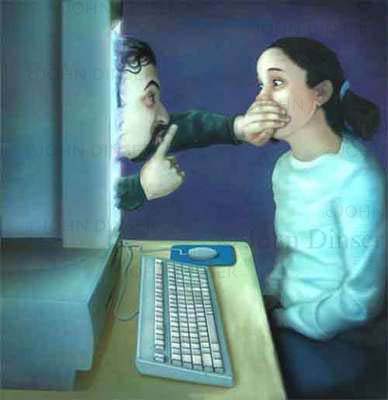This article is in continuation with my previous article on potential hazards that your child may face on online social networks like Facebook. When a Facebook child user gets victimized by online predators, parents tend to blame Facebook. To me this is quite ridiculous. Computers and software are emotionless stuff. They lack intelligence. Computers can win chess games –but computers can’t identify a good person from the one with bad intentions. Parents have a great role in ensuring children’s safety on Facebook. Remember, women and children are the most vulnerable and targeted group on Facebook for online predators.
Facebook has provided certain security settings to help in privacy of its users. On top of it, Facebook has declared that this social networking facility should not be used by underage children. Beyond this it is the job of parents to safeguard interest of their children. Parents are actually the first and best line of defense against online predators.

Online predators can cause trouble for your child if you are not cautious.
Following are some of the things that parents should do:
- First of all, talk to your kids about the potential dangers and unwanted effects of online life. It is of high importance that your kids understand your concerns. It would be best if they realize that there is a specific time and age for doing certain things. They should not use social networking until they come of age. However if they insist on having a Facebook profile before that –they should learn to be careful.
- If you’re already not on FB, you should also create a profile for yourself and become friend with your kid’s profile. This way you’ll be able to monitor most of the things that your child is doing on Facebook.
- It is always better if your child befriends only the known people. For example: relatives, classmates, teachers and neighbors
- Tell your child not to post personal information (like home/school address, phone number etc.) in public.
- Your child should not post a lot of his/her photographs. Such photos, even if perfectly normal, may land up in wrong places on Internet.
- Keep the profile information visible only to people in your friend list.
- Tell your kid to discuss with you if anything online causes stress/anxiety/fear to him/her.
- Don’t let your child post anything which can show that s/he is distressed. Online predators sift through thousands of profiles to look for kids who appear to be troubled. You don’t want to attract their attention. Your child’s profile and wall content should be all positive.
- Account password must be strong; must be kept secret and must not be guessable. Password should also be changed often. It’s better if you know the password of your child’s profile so that you can make intervention if need be.
- Child’s computer should be kept clean of viruses, worms, trojans and other kind of malware. You should regularly scan your child’s computer with a good anit-virus software
- Don’t allow your child to go to cyber cafes. It would be better if s/he uses only the home computer for social networking (or anything else for that matter).
- Parents should not use the same computer to visit adult websites –some of these websites are capable of installing unwanted programs on your computer if you are not careful. This could compromise not only your but your child’s online security as well.
- Although nowadays kids are smart enough to wipe their digital footprints clean. But still you can try and check the history of their web browsing. There are programs available that can secretly record the activities on a computer. You may use one of these programs to monitor what’s happening on your computer.
- Instill confidence in your child to tell you if they are growing closer to someone online.
- Inform your child about the dangers of meeting an online friend in person. Not all people are good.
- Tell your child that Facebook is just to share updates with friends. The Facebook “walls” should not be used to get into arguments with online friends. If kids, or even adults, have a problem with a friend –it’s better to sort it out over the phone or in person.
I believe if you will follow these suggestions –you could minimize the chances of online troubles coming your child’s way. Happy parenting!

bachee ko ush school mai admission na karay jaha par disha hin teacher posted hoo.taki aap ka bachho apani pahchhan khokar feature mai aap ko sarmindid kar de. Aaj eshi ka fhal hai ki maa baap dura bachhe ko saman na meel pana aur bachhe dura maa baap ko saman nahi meel raha hai.
Thank you very much bhaiya for giving us such a good king of information about facebook
security. I was making the mistake but after getting your tips about facebook, now i will never make the mistakes. Thank you once again!